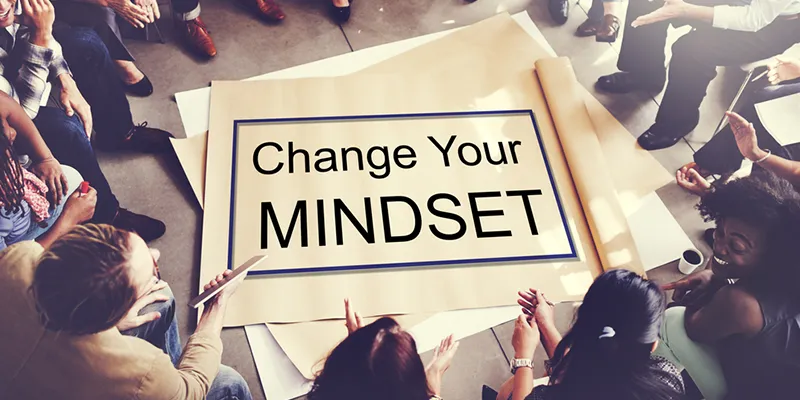How a fixed mindset can slow down your growth in a company
Everyone has a capacity for lifelong learning. But it begins with changing your own perceptions of yourself. It is best to move from a fixed mindset to a growth mindset for a life of success and happiness.
Your mindset affects every aspect of your life. Your personality grows out of it, it shapes how you combat challenges and of course, how you deal with failures. Today, scientists, for the first time in history, believe that our brains—and by extension, our personalities—are not rigid, that people have the capacity for lifelong learning and brain development.
Abilities are not carved in stone
Carol Dweck in her book, MindSet, minutely explores this phenomenon and the problem with the fixed mindset. She explains that those with a fixed mindset believe that their abilities are carved in stone. That in this world, there are people who are superior and some who are inferior.
This belief is further enhanced by the society we live in. For instance, author Malcolm Gladwell suggested that as a society we value natural, effortless accomplishments over achievement through effort. It’s as if Sachin Tendulkar popped out of the womb batting and Lata Mangeshkar crooning.
The disadvantages of a fixed mindset might seem obvious but they have a lifelong impact on how we approach learning, and inevitably growth.
Problems of a fixed mindset
Dweck observed people’s brain waves when they came into her brain-wave lab at Columbia and asked them some questions. People with a fixed mindset, she observed, were only interested or paid close attention when they were told whether their answers were right or wrong. But when they were presented with information that could help them learn, there was no sign of interest. On the other hand, people with a growth mindset paid close attention to information that could stretch their knowledge.
This points at an important distinction between people with a growth and fixed mindset. There’s in fact, also a distinction between what we believe and what we do. The good part is that knowing about our mindset can pave the way to changing it.
Identify a fixed mindset
It’s not difficult to identify if you have a fixed mindset: Do you pass a chance to learn because you’re overwhelmed with failure? Or do you get discouraged when something requires a lot of effort? Are you always concerned with outcome? If yes, then you’re probably a victim of the fixed mindset.

Don't hold on to fixed ideas. A growth mindset can take you far
Get a growth mindset
The growth mindset, on the other hand, allows people to value what they’re doing regardless of what the outcome will be and thanks to that attitude, inevitably, the outcome is better.
The theory is further proved by a study where psychologists, Robert Wood and Albert Bandura created thirty groups with three people each. One group thought that your skills could grow with experience, the other thought they couldn’t. In other words, half the groups had people with a fixed mindset and the other half with a growth mindset.
Each team was then tasked with placing employees in the right jobs and figuring out how to motivate them for productivity. However, in the group with a fixed mindset, there was little discussion internally, lack of productivity and no learning process. The performance of the fixed-mindset group demonstrated how our own thinking can limit our potential and ability.
So how can we develop a growth mindset?
Reign in your judgment
Those with a fixed mindset put a strong evaluation on every piece of information. Everything gets assigned a positive and negative label. While those with a growth mindset do so too, but they, Dweck notes, are ‘attuned to its implications for learning and constructive action: what can I learn from this? How can I improve?' A good way to begin is by reigning in your judgment and critically looking at situations.
Stop self-limiting Beliefs
It’s important to dispel our self-limiting beliefs or the stories we tell ourselves to be convinced that we cannot do something. A student might think she sucks at maths because of one mediocre or bad performance and develop a lifelong fear and start refraining while another would allow herself to get over the failure and try again.
It’s not that those who take on challenges don’t experience failures, but that they don’t let their self-limiting beliefs grip them to a point where there’s no way out. Identify your self-limiting beliefs and quieten that voice in your head that tells you that you cannot do something.
Cultivate self-awareness
Throughout history, people who’ve succeeded have not had immoderate self-esteems as much as self-awareness. They’ve spent time unravelling themselves and knowing what they’re good at and what they’re not. Cultivating a sense of self-awareness means working on becoming extraordinarily aware of not only your weaknesses but also your strengths and your talents. Role models, mentors, friends and especially teachers can help you draw a realistic profile of yourself.
Developing a growth mindset, like anything else, is about willingness and commitment. It might be a difficult, lesser-taken route but its numerous advantages should compel you to at least give it a try.
(This article is from Thrive Global)







